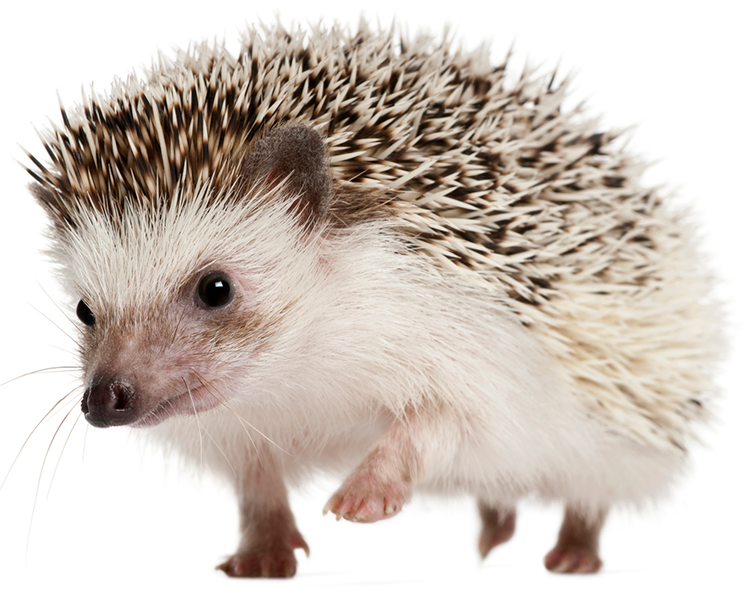If you need a hedgehog veterinarian to help you care for your pet, get in touch with us! We can advise you on every aspect of their care, from nutrition and housing to exercise and handling. Our team can also provide medical care when needed if your hedgehog ever becomes ill. We highly recommend annual wellness exams to make sure your pet is staying as healthy as possible. If you notice that your hedgehog is eating less, moving around less, or acting uncomfortable, call our hospital to schedule a checkup.

Home Care Tips for Hedgehogs
- Hedgehogs should eat a staple diet specifically made for them. Food should NOT be available at all times and must be provided in portioned meals in order to prevent obesity. Follow the instructions for feeding on the packaging.
- Provide insects such as mealworms, dubia roaches, earthworms, waxworms, and crickets as daily treats in moderation. All invertebrates must be fed a nutritious diet (we recommend Repashy Bug Burger) prior to being fed to your hedgehog so they provide the appropriate nutrients.
- When feeding, you can hide food and treats in bedding to encourage foraging and mental stimulation. Food should be provided around dusk and removed in the morning if uneaten.
- Sometimes, hedgehogs can be wary of new foods added to their diet and may need them to be introduced slowly.
- Clean water should always be available via a sipper bottle and a ceramic or glass dish. Any dish should be heavy enough to prevent spilling, but not large enough for the hedgehog to fall in. If your hedgehog drinks well from a sipper bottle, the dish may be removed.
- Hedgehogs should always be housed individually.
- Because hedgehogs are so active, they should have a large enclosure with floor space measuring at least 2’ by 3’.
- Enclosures with plastic bottoms and plastic or wire walls are recommended. Wire cages must be narrow enough to prevent escaping and prevent injury to your hedgehog’s head or limbs.
- The enclosure floor should be covered in soft, absorbable bedding. Avoid wire, cedar, pine, aspen, corncob, or dusty/scented substrates. Additionally, you may place cloth for bedding, but be sure your pet’s toenails do not get caught.
- Soiled bedding should be removed every other day and all bedding should be replaced at least once weekly.
- Additional supplies that can be placed in the enclosure include cardboard or wooden boxes, flowerpots, cloth bags, PVC tubing, and a solid plastic rodent exercise wheel. The wheel should be at least 10-12 inches in diameter, with an open construction and smooth, easy-to-clean surface–no wires or mesh, which can potentially injure your hedgehog.
- Hedgehogs should be allowed out of their enclosure on a daily basis for additional exercise. Hedgehogs must be monitored at all times when outside of the enclosure or when using swimming tubs, climbing structures, and other toys.
- Hedgehogs can be sensitive to temperature changes and should always be in an environment with a stable temperature between 75 to 85°
- Hedgehogs can tolerate temperatures between 72 to 90°F, but should not be exposed to temperatures outside of this range for a long period of time as it will cause them to go into torpor (a hibernation-like state of inactivity).
- A hedgehog’s spines are their defense mechanism when threatened, at which time they will curl up in a tight ball.
- Hedgehogs are nocturnal; therefore they will spend their days hidden in burrows and their nights foraging for food.
- Hedgehogs practice behavior that is known as “anointing,” which means that when they come in contact with a novel scent, they will lick and bite at it and create a frothy saliva that is then spread on the spines. The reason for this behavior remains unknown but is very normal.
- Oftentimes, hedgehog illnesses can go unnoticed. A general exam is recommended at least once yearly to allow your hedgehog’s veterinarian to detect and diagnose any issues. If you notice any subtle changes in behavior, appetite, drinking, defecation, urination, or weight, we need to see your hedgehog for an exam.
- Monitoring your hedgehog’s weight weekly can help with detecting illnesses. If your hedgehog’s weight decreases by 10% or more suddenly, please contact us immediately.
- Male hedgehogs do not require neutering unless there is a medical cause that requires it. Female hedgehogs should be spayed to prevent uterine cancer.
- Obesity is a common problem for hedgehogs, so it is important to avoid overfeeding.
- If your hedgehog seems to enter into a hibernation-like state, please contact us as this state can suppress their immune system and may result in more serious illness or even death.


